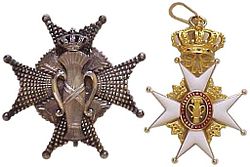Vasaorden
| Royal Order of Vasa Kungliga Vasaorden |
|
|---|---|

Star and cross of the order
|
|
| Awarded by the monarch of Sweden | |
| Type | Five grade order of merit |
| Established | 1772 - 1975 |
| Royal house | Bernadotte |
| Eligibility | Swedish and foreign citizens |
| Awarded for | Services to agriculture, mining, art, trade, industry, crafts and education. |
| Status | Rarely constituted |
| Sovereign | King Carl XVI Gustaf |
| Chancellor | Ingemar Eliasson |
| Grades | Commander Grand Cross (KmstkVO) Commander 1st Class (KVO1kl) Commander (KVO) Knight/Member 1st Class (RVO1kl/LVO1kl) Knight/Member (RVO/LVO) |
| Statistics | |
| First induction | 1772 |
| Precedence | |
| Next (higher) | Royal Order of the Polar Star |
| Next (lower) | The Medal of the Seraphim |
|
Ribbon bar of the order |
|
The Royal Order of Vasa (Kungliga Vasaorden) is a Swedish order of chivalry, awarded to citizens of Sweden for service to state and society especially in the fields of agriculture, mining and commerce. It was instituted on 29 May 1772 by King Gustav III. It was unrestricted by birth or education and could therefore be awarded to anyone (as opposed to the Order of the Polar Star, which was intended as a reward for the learned professions). It was the most junior of all the Swedish orders. It was often awarded to Norwegian subjects of the dual monarchy until Oscar I founded the Norwegian Order of St. Olav in 1847. Since 1974 the order is no longer conferred: officially it has been declared as "dormant", along with the Order of the Sword.
The Swedish royal barge Vasaorden takes its name from the order.
The Order had five classes:
Additionally, the Badge of Vasa and the Medal of Vasa, were both worn on a ribbon on the left chest.
The royal barge built for Gustav III, named Vasaorden, is still used on rare ceremonial occasions
Star and collar of the order.
...
Wikipedia
